SVS Sound
You’ve got the speakers, you’ve got the soundbar … but your home theater is still missing something: that deep, rumbling bass that truly immerses you in the action. We’re here to help you find the perfect subwoofer to complete your audio setup.
We’ve rounded up the best subwoofers of 2024, whether you crave the earth-shaking rumble of an action movie or the subtle thump that brings your music to life. From powerful beasts that will shake your foundation to sleek, compact options for smaller spaces, there’s a sub on this list for everyone.
Our top pick, the SVS SB16 Ultra, is an absolute monster that delivers incredibly deep and articulate bass. But we’ve also got stylish gems like the Klipsch Reference 12 and boutique beauties from Kanto.
Get ready for a truly cinematic experience with deep, powerful bass that will transform your home theater. Ready to feel the difference? Explore our top subwoofer picks (and best soundbars with subwoofers) and find the perfect match for your home theater. We’ll even guide you through the setup process.
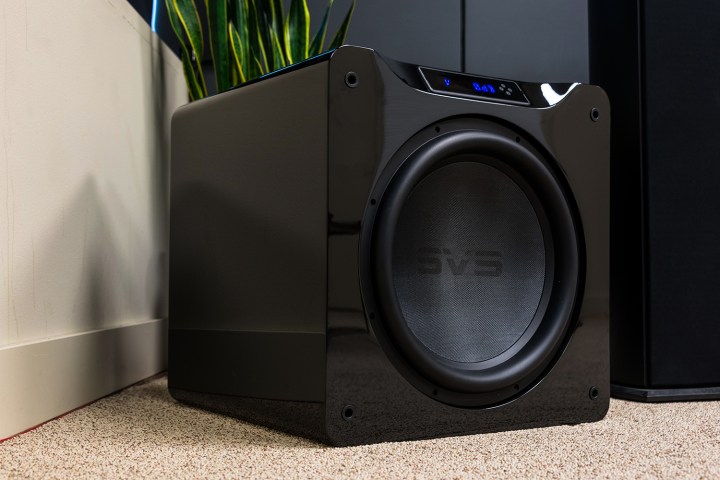
Bill Roberson/Digital Trends
SVS SB16 Ultra
The best overall subwoofer
Pros
- Gorgeous design
- Incredibly deep, powerful bass
- Smooth and articulate
- Does the work of two subs
- First-class control app
Cons
- Could be large for some rooms
The SVS SB-16 Ultra has been on our list for some time, mainly because we haven’t found anything worthy to take its place. This subwoofer has become our measuring stick, which might actually be unfair to the competition — it’s that good. Beneath a sleek, stylish subwoofer box, the cubic SVS SB16 houses a monstrous 16-inch Ultra driver with an 8-inch, edge-wound voice coil and a ridiculous 1,500-watt continuous Sledge amplifier with discrete MOSFET output that tops out at 5,000 watts peak power.
Additionally, a smartphone app for iOS and Android has upped the SB16 Ultra’s game significantly, taking the pain out of setting up your sub by allowing you to fine-tune the speaker from your optimal listening position and create custom presets for different listening situations.
All of this is to say: No matter how you’re using the SB16, it impresses. Gunshots and explosions in films register with a hefty thump to the chest, and the sub manages low-end instrumentation beautifully, allowing acoustic bass to bounce smoothly while electronic bass and kick drums shake the foundation of your home. For our money, this is the best subwoofer you can buy, period.
Honorable mention goes to the HSU ULS-15 MK 2 and the Monoprice Monolith range of subwoofers, two of the best-sounding $1,000-plus subwoofers we’ve checked out recently.

SVS SB16 Ultra
The best overall subwoofer

Klipsch
Klipsch Reference Series 12 (R-121SW)
The best subwoofer for the style conscious
Pros
- A sleek and stylish aesthetic
- Powerful digital amplifier
- Revamped cone design means little distortion
Cons
- A bit pricey
- Klipsch-style drivers may not be for everyone
Klipsch is constantly reinventing its own wheel, and when you consider the fact that there aren’t many problems to address in the first place, it only goes to show just how much the brand cares about looks and performance. Thus, we arrive at the Klipsch Reference Series 12 R-121SW.
We love the fact that Klipsch went back to the drawing board to create an all-new woofer design. The sub’s front-firing 12-inch cone is composed of what the company calls thermoform crystalline polymer, delivering a resounding low-end experience with minimal distortion, and with a much lighter chassis. There’s also the onboard digital amplifier, the heart and lungs of the 121SW, supplying up to 400 watts of unequaled power with pinpoint accuracy.
If you’re looking for a rock-solid woofer from a name that ensures reliability, the Klipsch Reference Series 12 R-121SW is certainly the way to go.

Klipsch Reference Series 12 (R-121SW)
The best subwoofer for the style conscious
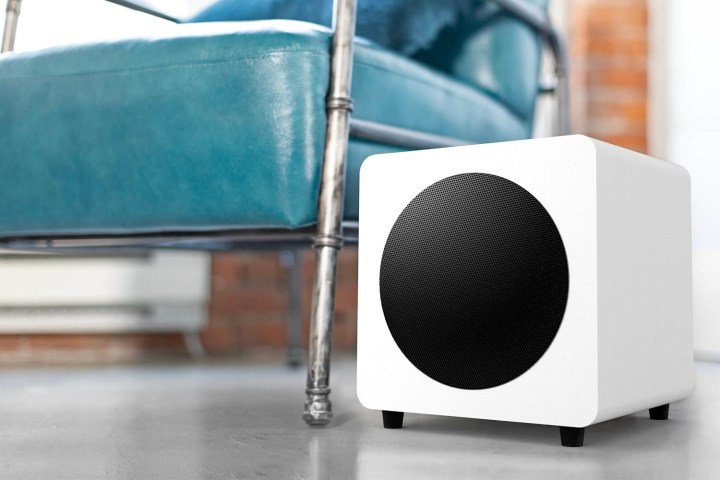
Kanto
Kanto Sub8 Powered Subwoofer
A boutique woofer for a non-boutique price
Pros
- Up to 300W peak power
- Classy design
- 40Hz to 120Hz crossover adjuster
- Includes phase switch
Cons
- May sound muddy when paired with certain speakers
Brands like Kanto are tremendous at delivering the types of speakers that scream “boutique” without smacking you with specialist pricing. In the case of the all-powerful Kanto Sub8, the company has designed a woofer that can be easily integrated with pretty much any speaker brand out there.
Available in Matte Black or Matte White finishes, the Sub8 uses medium-density fiberboard housing to keep vibrations and distortion to a minimum. Rubber feet, a metal grille, and a final layer composed of vinyl are paired with Kanto’s sturdy cabinetry, making for a sub that can respond to audio information in a fast and detailed manner. And at just about 11 inches (both in width and height), the Sub8 is easy enough to tuck away, although the its appearance is one we wouldn’t pass up seeing on a daily basis.
Delivering up to 300 watts of peak power, the Sub8 also includes a high-pass filter (adjustable from 40Hz to 120Hz) and a phase switch, ensuring you’ll be able to match this formidable woofer with any Kanto or non-Kanto surround setup.

Kanto Sub8 Powered Subwoofer
A boutique woofer for a non-boutique price
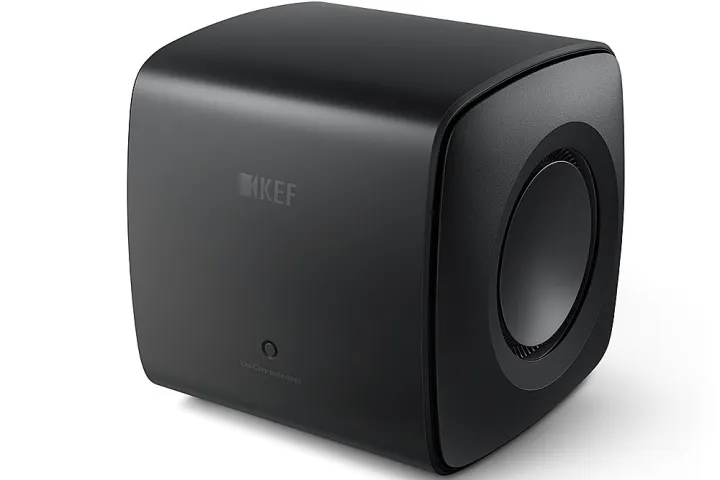
KEF
KEF KC62 Subwoofer
The best small subwoofer
Pros
- Can deliver up to 1,000 watts
- Incredibly small footprint
- Excellent sound quality
- Plenty of EQ options
KEF is one of those speaker brands that is always coming up with new ways to blow our minds, and the KC62 Subwoofer (available in black and white finishes) is a jaw-dropping sub that’s no bigger than a basketball. And the craziest part? This basketball can deliver up to 1,000 watts of smooth, thumping low-end. We’re not kidding.
That’s on top of two 6.5-inch Uni-Core force-canceling drivers, an assortment of EQ options to truly dial in the sound, and a cabinet tailor-made to reduce unwanted distortion and vibrations. Yes, it’s more expensive than a majority of the woofers you’ll find in this roundup, but KEF is simply one of the best brands money can buy, and just look at it, for Pete’s sake.
How can something so small be so powerful? Thank KEF for that.
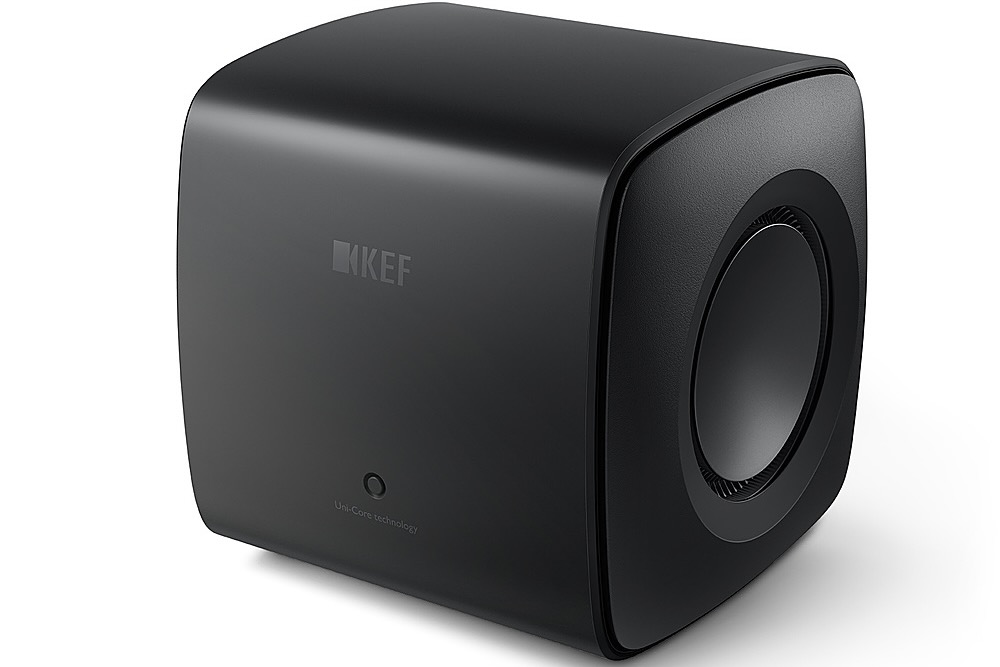
KEF KC62 Subwoofer
The best small subwoofer

Cambridge Audio
Cambridge Audio Minx X201
Great for smaller spaces
Pros
- Rich and punchy sound
- Takes up very little space
- Built-in DSP for fine-tuned performance
Cons
- Somewhat pricey
- Not the best option for larger spaces and speakers
Not every living room can be the size of a full-on movie theater. For all the apartment dwellers out there, we totally understand the annoyance of trying to fit a surround system into a room with square-footage limitations. This is why we’d like to draw your attention to the Cambridge Audio Minx X201.
Whether you opt for the Gloss Black or Gloss White finish, the Minx X201 is the perfect powered sub for small spaces and smaller speakers. At right around 8.5 inches in height, width, and depth, you’ll be able to fit the X201 into just about any home theater — and it’s packed with incredibly useful audio features too. One of our favorites has got to be the “auto-on” mode, which automatically turns the sub on when an LFE signal is detected.
You’ll also be able to adjust the crossover from 36Hz up to 200Hz, and can choose from zero, 90-degree, and 180-degree phase settings. There’s even a built-in digital signal processor (DSP) that calibrates every audio source to ensure the best low-end delivery for whichever movies, shows, and music you’re listening to.

Cambridge Audio Minx X201
Great for smaller spaces
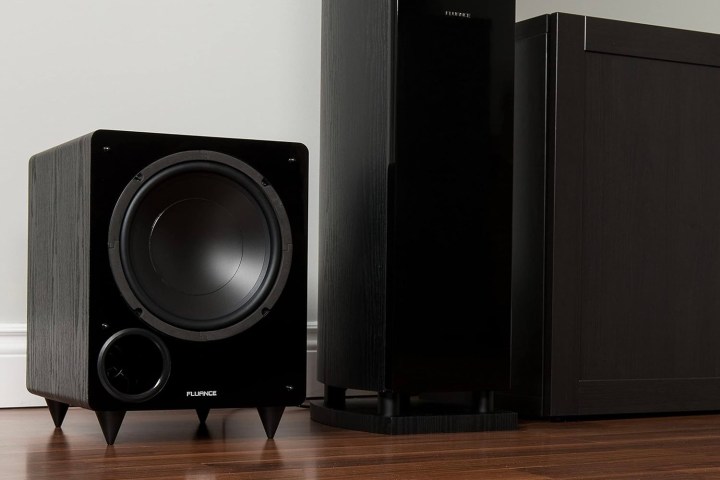
Fluance
Fluance DB10W 10-inch Subwoofer
The best subwoofer on a budget
Pros
- Meshes well with other speakers
- Classy design
- Solid price
Cons
- Doesn’t deliver the deepest bass
Fluance is an awesome AV company, friends. Whether you need a solid set of powered Bluetooth speakers, a full surround sound configuration, or you’re shopping for a sub (which is probably why you’re reading this article), Fluance has got you covered. In terms of the latter, we’re big fans of the Fluance DB10W 10-inch woofer.
Available in Natural Walnut and Black Ash finishes, the DB10W uses MDF material and a front-facing, precision-tuned bass port to deliver clean, distortion-free sound. That’s on top of Fluance’s next-level integrated amp, which ensures you’ll have enough power at low and high volumes.
One of our favorite DB10W features is the auto power-on function. Whenever the DB10W detects an LFE signal, it automatically powers on, and shuts down when you toggle off your AV receiver. You’ll also be able to adjust the sub’s master volume and crossover range (40Hz to 180Hz).
Fluance products are pretty understated and classy-looking too, so even if you’re adding the DB10W to a non-Fluance speaker setup, it should play nicely with whatever cones and drivers you already own.

Fluance DB10W 10-inch Subwoofer
The best subwoofer on a budget
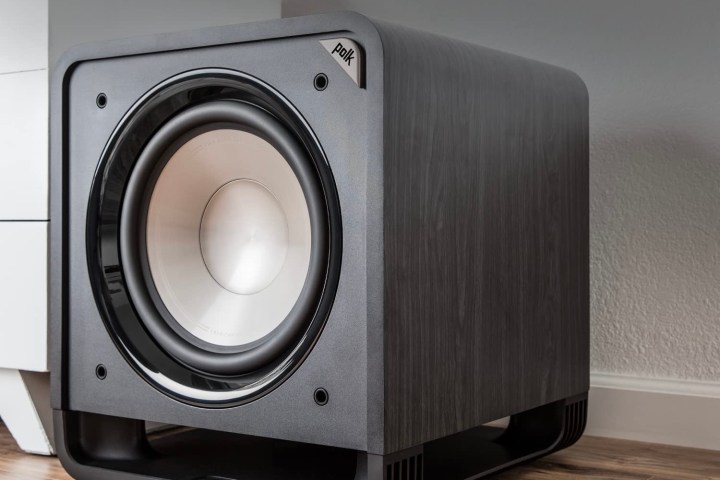
Polk
Polk Audio HTS 10 Subwoofer
The dark horse subwoofer
Pros
- Terrific performance for movies and gamings
- Distortion-reducing tech for noise-free sound
- Includes crossover and phase adjustments
Cons
- Not as powerful as other models
The Polk Audio HTS 10 is an unsung gem in the world of subwoofers, and we’re glad to have unearthed it.
Utilizing Polk’s impressive Dynamic Balance Technology, this 10-inch front-firing woofer is engineered to evenly distribute sound throughout your theater space. That’s on top of Polk’s distortion-reducing tech that ensures every last decibel is as articulate and profound as can be.
You’ll also get adjustments for volume, low-pass filtering, and phase toggle — and, rest assured, wattage juggernauts. While the HTS 10 won’t reach the peak heights of something like the KEF62, you can expect peak wattage to hit around 200, which is plenty of thud for most music, movies, and games.

Polk Audio HTS 10 Subwoofer
The dark horse subwoofer

Sonos
Sonos Sub (3rd Gen)
Best subwoofer for Sonos systems
Pros
- Huge, smooth low end
- Easy setup
- Can be hidden away
- Seamless addition to a Sonos surround system
Cons
- Expensive
- Can only be used with Sonos
If you’re already been the proud owner of some Sonos Wi-Fi speakers and were curious about adding a Sonos Sub to either improve the oomph of your music or create a surround sound system for your home theater, then we’re probably not the first to tell you that this is a great idea. While it’s a bit on the expensive side at $800, what you’re getting is some impressive deep bass sound that not only adds well-blended room-filling low end to your tunes but also impact and chest-pounding depth to movies.
Make sure you warn your neighbors first because the Sonos Sub can get loud. Compatible with any Sonos speaker (new or old), including Era, One, Move, and Roam, as well as the Beam and Arc soundbars, adding a Sub (or multiple Subs) to your setup is easy with the Sonos app — and cable-free.
You can then use the app to configure your sound, fine-tune the EQ and blend level, and even tweak it to specific rooms with the Trueplay software that measures acoustics and sets the sound accordingly. Music is clear, the bass is tight and never boomy, and you can pretty much place the Sub wherever suits your decor or furniture situation — even under media stands.
But where Sonos enthusiasts might be most intrigued is how easy it is to create a surround sound setup by combining a Sub with other Sonos speakers — for example, the Dolby Atmos-capable Sonos Beam (Gen 2) or Arc soundbars in the front with a pair of stand-mounted Ones or Era 100s as rears is a great-sounding configuration that’s easy to do.

Sonos Sub (3rd Gen)
Best subwoofer for Sonos systems
Frequently Asked Questions
Are bigger subwoofers better?
They can be. Larger woofers can produce more accurate, room-filling bass with a bigger “shake” factor than smaller models. But that’s only one consideration. A poorly constructed large subwoofer may rattle too much, for example, while smaller models with plenty of power can still do a great job.
Does my speaker system need a subwoofer?
It’s a really, really good idea. Home theater systems are generally designed with a subwoofer in mind. So are the latest movie audio standards.
Can I use two subwoofers at once?
You can, although it isn’t common in home setups. Just make sure that your receiver can handle two subwoofer connections. Some people prefer using two smaller woofers that they can strategically place in their theater to get the best multi-directional bass.
Wait, is there a difference between a woofer and a subwoofer?
The terms are frequently used interchangeably. Traditionally, a “woofer” can refer to a driver that has a higher frequency response than a subwoofer, less dedicated to pure bass sound, and more likely to be part of a speaker than a standalone unit.
How do you test?
We run the subwoofer for several hours before beginning any critical evaluation. While there is much debate over whether the “break-in effect” is real, we prefer to get that factor covered so it doesn’t play a role in our evaluation one way or another.
Our subwoofer tests take place in at least two different rooms, any of which we are intimately familiar with, and we generally test the subwoofer in three locations that we know offer the best possible response within those rooms. Testing material includes everything from test tone sweeps to blockbuster movies and a selection of music from multiple genres. We seek to learn how deep a sub can play, how visceral the low bass response is, how well it can be adjusted to integrate with both small and large satellite speakers, and how musically accurate it is capable of playing.
We hope for a versatile subwoofer, which can not only belt out the big bass notes needed for a high-impact action movie, but one which can also stay tight and tuneful when playing acoustic upright bass, or reproducing the classic Fender P-bass tone. A good subwoofer will avoid tubby, boomy sound that lacks definition, and instead integrate itself seamlessly into a larger audio system, calling attention to itself only during instances in which its pure muscle can’t be ignored.
If you’ve already made your choice, check our subwoofer setup guide to get everything put together correctly and our calibration guide to help maximize performance in any listening space.

